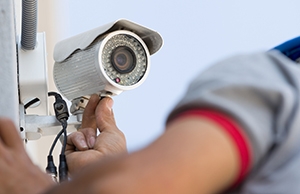Technology
A video surveillance system may be a good investment for the security of your business.
It may sometimes seem that nearly every aspect of our lives is recorded. Although we may choose to record and share some of our moments on social media platforms, many more typically mundane moments are captured by security cameras that monitor the public and private spaces of our society. If you think your business could benefit from a surveillance system, take care to consider your options before making a purchase.
Advantages
There are two key elements to a video surveillance system: the recording system and the cameras themselves. As an owner or manager of a business, there are plenty of advantages to considering a video surveillance, or closed-circuit television (CCTV) system as a part of your business’ security. Some of the benefits may include:
- deterring crimes such as theft and vandalism
- protecting employees
- monitoring key entry points, areas and assets
- monitoring machinery and production processes
- providing evidence in the event of an incident
Cameras
A higher resolution camera, such as high definition (HD) 1080p will produce much more detailed images than a lower resolution camera. The ability to make out a face, or a licence plate clearly could be quite important. Many security camera models capture 15-30 frames per second (fps); a higher frame rate will provide smoother video. While a higher resolution and frame rate are clearly better both require more storage capacity.
If you have a large area to cover, you might consider cameras with a wide-angle lens. You may also want to consider zoom lenses to allow close up videos when required. Be sure to use outdoor cameras for outdoor installation; indoor models may not be sufficiently resistant to the elements, or durable to vandals.
Recording System
Secure storage of the recorded images is the heart of your surveillance system. Security images can be recorded using a dedicated appliance such as a Digital Video Recorder (DVR) or Network Video Recorder (NVR), a PC or even in the Cloud. The number of cameras the system can support may be limited by the hardware, software or even licences; whichever type of system you choose, be sure to leave room to expand.
Traditional CCTV systems are simpler to set up and more secure than their networked cousins because they use dedicated analogue coaxial cabling to transmit their images. A DVR receives the camera signals, processes the images and stores them in a compressed digital format that can be retrieved for later playback. A PC with both video-capture hardware and recording software can also perform the same task. In both cases, the hardware physically limits the number of video feeds that can be recorded.
Digital IP-based cameras can be more complex to set up, but the use of Internet standards provide for greater flexibility; IP cameras use Ethernet cables, or even WiFi, just like the other devices on your network. Aside from technological differences, an NVR serves much the same purpose as a DVR; the hardware may, however, limit the number of video signals it can receive and store. A PC with the right software can also be used to receive, store and play back video from your IP cameras; specialized hardware is not required. Many IP systems also allow live or stored video to be retrieved remotely, commonly via a web interface or even a mobile app.
An IP-based camera system can be recorded in the Cloud for a subscription fee.
If you prefer a more hands-off solution, an IP-based camera system can be recorded in the Cloud for a subscription fee. Keep in mind that this may require a lot more Internet bandwidth than if you just store your video locally. IP-based systems do require extra security – like the rest of the computers and devices on your network, they can be hacked.
Regardless of whether you choose CCTV or an IP-based system, storage capacity is an extremely important consideration. The video resolution, frame rate, number of camera feeds and length of time you need to keep your recordings will dictate the minimum amount of hard drive space you need. When the storage runs out, older recordings will be replaced by new ones; more capacity to start with is better.
Do not do it yourself
The many technical, mounting, transmission and security issues that accompany installation of surveillance cameras suggest hiring outside experts to install the equipment is the preferred way to go. When one considers camera requirements, weather conditions, positioning for maximum transmission and recording along with wiring, DVR/NVR placement, not to mention a service contract and warranty, spending a few dollars for installation is a smart expenditure.
Legal Issues
Even though the use of surveillance cameras in the workplace is quite common, Canadian courts are not in favour of the frivolous use of surveillance that infringes upon an employee’s right to privacy. The key question that must be answered before installing surveillance cameras in the workplace is: “Should the employee have a reasonable expectation of privacy?” As such, constant monitoring in the workplace may be frowned upon. Where cameras are installed in general areas, consider posting notices in conspicuous places to indicate the area is monitored. Such signs remove any doubt as to the expectation of privacy. If in doubt, it may be prudent to seek legal advice before installing a new surveillance system.
Plan Ahead
Before making a decision to buy a surveillance system, consider the needs of your business, your budget limitations and the legal aspects of installing cameras. If you decide to proceed, get equipment designed for commercial use. Avoid consumer-grade components which may be less durable and provide less flexibility. Buy the best you can afford.
Contact Argento CPA today!
Source: BUSINESS MATTERS
Disclaimer: BUSINESS MATTERS deals with a number of complex issues in a concise manner; it is recommended that accounting, legal or other appropriate professional advice should be sought before acting upon any of the information contained therein.


